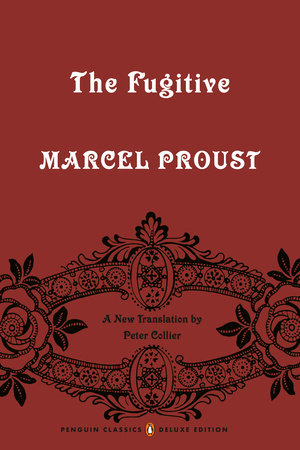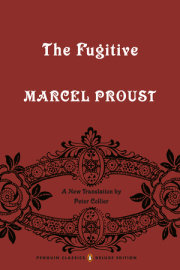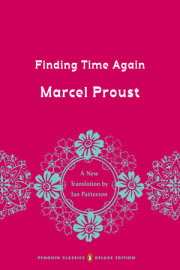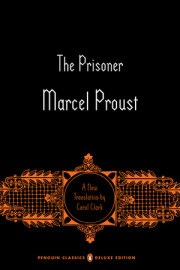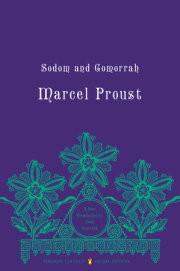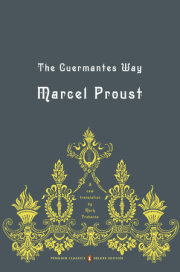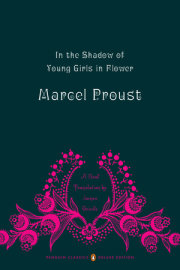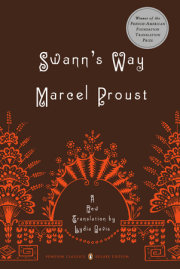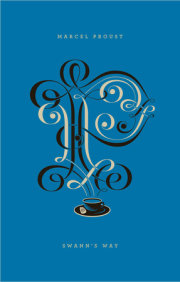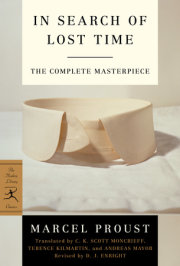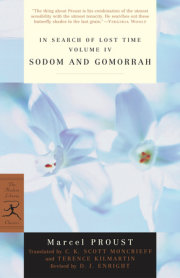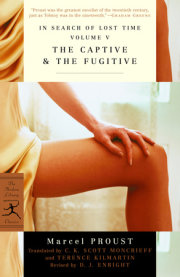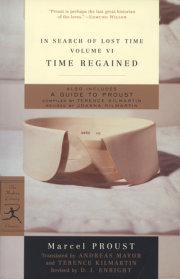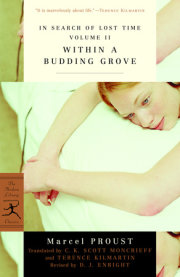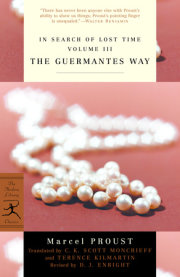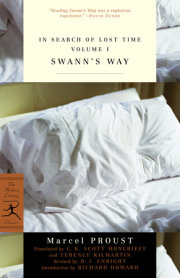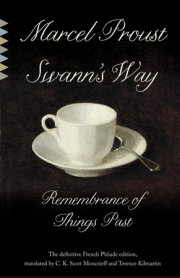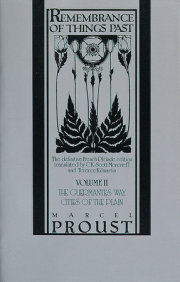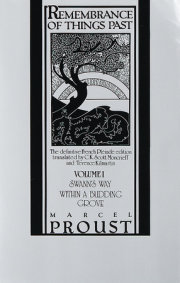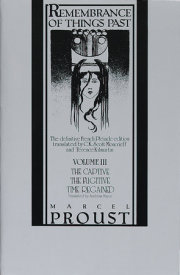CHAPTER 1
Grieving and Forgetting
‘Miss Albertine has left!’ How much more sharply suffering probes the psyche than does psychology! A moment earlier, as I analysed my feelings, I had thought that leaving her, without ever seeing her again, was exactly what I wanted, and comparing the mediocrity of the pleasure which Albertine gave me with the richness of the desires which she prevented me from achieving, I had concluded my subtle heart-searching by finding that I no longer wanted to see her, that I no longer loved her. But these words: ‘Mademoiselle Albertine has left’ had just caused such pain in my heart that I felt that I could no longer hold out. Thus something which I had thought meant nothing to me, was quite simply my whole life. How little we know ourselves. I must immediately put an end to my suffering; feeling as gentle with myself as my mother had been with my grandmother on her deathbed, I told myself, with all the good will that we lavish on those we love in order to spare them from suffering, ‘Be patient just one moment, we’ll find a remedy, don’t worry, we won’t let you suffer like this.’ It was in this realm of ideas that my instinct for self-preservation sought the first balm available in order to apply it to the open wound: ‘None of this is of any importance, because I shall get her to return straight away. I’ll have to think of a way, but in any case she will be here by this evening. Therefore there is no need to worry.’ ‘None of this is of any importance’, I was not content merely to persuade myself of this, but I tried to give Françoise the same impression, by not revealing my torment in her presence, because, even at the moment when I suffered so violently, my love would not let me forget the importance of making it appear to be a mutually happy love affair, above all in the eyes of Françoise, who did not like Albertine and doubted her sincerity. It is true that a moment earlier, before Françoise had appeared, I had thought that I no longer loved Albertine, believing that I had taken everything into account, that I was completely lucid and that I had plumbed the depths of my heart. But however great our intelligence, it cannot conceive all the elements that constitute it and which remain undetected as long as no event capable of isolating them makes them start to solidify out of the volatile state in which they exist for most of the time. I was mistaken when I thought that I saw clearly into my heart. But this knowledge, which the finest insights of my intellect had not given me, had just been brought home to me, as hard, dazzling and strange as crystals of salt, through the sudden stimulus of pain. I had become so accustomed to having Albertine beside me, and now I suddenly saw Habit in a completely new perspective. Until now I had considered it above all as a negative force suppressing the originality and even our awareness of our perceptions; now I saw it as a fearsome goddess, so attached to us, with her inscrutable face so grafted on to our hearts that if she detaches herself and turns away from us, this deity, whose presence we were barely able to discern, inflicts upon us the most terrible suffering, and then she is as cruel as death.
The most urgent thing was to read Albertine’s letter, since I needed to consider how to bring her back. I imagined that this was within my grasp, because, since the future exists only in our minds, we think that we are still able to control it by a last-minute act of will-power. But at the same time I remembered that I had seen the future inflected by powers other than mine, against which, even with more time available, I could have done nothing. What does it avail us that the hour has not yet struck, if we can do nothing to prevent what it will bring? As long as Albertine was still living with me, I was determined to maintain the impetus of our separation. But now she had left. I opened Albertine’s letter. This is what it said:
‘My dear friend, do forgive me for not having dared to say to your face the few words that follow, but I am a coward, I have always been so afraid of facing you that, despite my efforts, I was unable to pluck up the courage to do so. This is what I would have liked to tell you: “Life together has become impossible, besides, you must have realized from your tirade the other evening that something in our relationship had changed. What could have been remedied that evening was to become irreparable over the next few days. It seems better therefore, since we have been fortunate enough to settle our differences, to leave each other on friendly terms”; that is why, my dearest, I am sending you this note, and I beg that you will be kind enough to forgive me for causing you a little grief, when you think of the far greater pain that I shall suffer. My dear old friend, I do not want to become your enemy, I shall already find it difficult enough to see you gradually, but all too swiftly, becoming indifferent towards me; and so since my decision is irrevocable, before asking Françoise to hand you this letter I will already have asked her to bring me my trunk. Farewell, I leave you with the best of me. Albertine.’
All of which means nothing, I told myself, it is even better than I had thought, for since she does not believe a word of all this, she has obviously written it only in order to make a scene, to frighten me, so that I will stop behaving unreasonably towards her. The most urgent thing to do is to make sure that Albertine returns home this evening. How sad to think that the Bontemps are corrupt people, using their niece to extract money from me. But no matter. Were I to offer half of my kingdom to Mme Bontemps in order to have Albertine back here this evening, enough would remain for Albertine and me to live in comfort. And at the same time I was calculating whether I would have time that morning to go out and buy the yacht and the Rolls-Royce that she desired, and, abandoning all hesitation, did not consider for a moment that I had thought it rather unwise to make her this gift. Even if Mme Bontemps’s agreement is not sufficient, and Albertine refuses to obey her aunt and stipulates as the condition of her return that she shall henceforth enjoy complete independence, well then, however much sorrow it should cause me, let it be; she may go out unaccompanied, as often as she likes; we have to accept the need to make sacrifices, however painful, in the interest of what we hold most dear, which for me, despite what I believed this morning in the light of my precise and absurd calculations, is that Albertine should live here with me. Should I, however, add that granting her this freedom would have caused me great distress? I would be lying. I had often previously felt that the suffering caused by leaving her free to do wrong far away from me might well be less than the kind of sadness which I sometimes experienced when I sensed her boredom beside me at home. Of course if at any particular moment, when she asked me if she could pay some visit, I would have found the idea of letting her go appalling, imagining a whole programme of orgies. But I had often been tempted to say, ‘Take our boat, take the train, go away for a month to some country that I don’t know, where I’ve never been, where I won’t know a thing about whatever you do,’ because I thought that, once distant from me, she would prefer to be back with me instead, and would be happier when she had returned. Besides, this is surely what she wants: she does not actually demand such freedom, which, I might add, I would easily manage to restrict from day to day by offering her new pleasures every day. No, what Albertine wanted was for me to stop behaving intolerably towards her, and above all – like Odette with Swann in former times – for me to decide to marry her. Once married, she would not worry about her independence; we would be so happy living here together! Of course that would mean giving up any idea of Venice. But how those much-desired cities like Venice – not to mention hostesses like the Duchesse de Guermantes or entertainments like the theatre – tend to pale, fade and die, when we are chained to another heart by a bond so painful that it prevents us from parting! Besides, Albertine is absolutely right on the question of marriage. Even Mama finds all the delay ridiculous. Marrying her was what I should have done ages ago, it’s what I must do now, that’s what has made her write this letter, not one word of which she believes; it was in order to achieve this that she renounced for a few hours something that she must want as much as I want her to do it: to return home. Yes, that is what she wants, that is her main intention, my reason said compassionately; but I felt, as I argued, that my reason tended to pursue the hypothesis that it had adopted at the outset, while I felt quite clearly that it was the other hypothesis which had constantly been corroborated. Of course, this alternative version would never have made so bold as to overtly formulate the theory that Albertine might have had a relationship with Mlle Vinteuil and her female friend. And yet, when I was overwhelmed with this terrible news just as we were drawing into the station at Incarville, it was the second hypothesis that had been confirmed. This theory had never yet suggested that Albertine might leave me of her own accord, in such a way, without warning and without giving me time to stop her. But even if, after the enormous mental leap that I had been obliged to take, the new reality which I had to face was as surprising as any revealed by a physicist’s latest discovery, a prosecutor’s fresh enquiry into a crime, or a historian’s new insight into some revolution, this new reality went far beyond the half-hearted premonitions of my alternative hypothesis, and yet helped to prove them right. This alternative hypothesis was not one formulated by the intellect, and the panic which I had experienced on the evening when Albertine had not kissed me, or the night when I had heard her window opening, was not a rational fear. But – as many episodes may already have indicated and what follows will show all the more – the fact that the intellect is not the most subtle, powerful and appropriate instrument for grasping the truth is only one more reason in favour of starting with the intellect rather than with the intuitions of the unconscious or with unquestioning faith in our premonitions. It is life which little by little, case by case, allows us to realize that what is most important for our hearts or our minds is taught us not by reason but by other powers. And then it is the intellect itself, which, recognizing their superiority, uses its reasoning in order to abdicate in their favour and accepts the role of collaborator and servant. It has ‘experimental faith’. The unexpected unhappiness which confronted me already felt familiar (as did Albertine’s friendship with two lesbians) from having been indicated by so many signs in which (despite my rational arguments using Albertine’s own pronouncements in order to prove the opposite) I had detected the tedium and repugnance that she felt at living in this slavish manner, in signs written as it were backwards and in invisible ink, in Albertine’s sad and submissive eyes, on those cheeks suddenly inflamed by an unexplained blush, or in the sound of a suddenly opened window! Of course I had never dared analyse them fully enough to formulate the precise image of her sudden departure. My spirits lulled by Albertine’s presence, I had envisaged only a departure arranged by me at an indeterminate date, that is, situated in a timeless zone; and consequently had only imagined that I thought of her departure, in the way that many people who think about death when they are in good health imagine that they do not fear it, and in fact do no more than introduce one purely negative notion into the heart of their good health, which would be precisely what the approach of death would alter. Moreover the idea of a parting planned by Albertine herself could have struck my mind a thousand times over, as clearly and unambiguously as you like, without my having any truer realization of what this departure would mean to me, that is, what it would mean in reality – something original, devastating, unknown, an entirely novel evil. Even if I had foreseen this departure, I might have thought of it ceaselessly year after year, without all such thoughts, even if joined together, having the slightest connection either in intensity or in quality with the unimaginable hell that Françoise had allowed me to glimpse when she said, ‘Miss Albertine has left.’ In order to represent an unknown situation, the imagination borrows elements already known, and for this reason fails to represent it. But our sensibility, even at its most physical, remains scored long afterwards by the original and long-indelible mark of the new event, as the furrow scored by a flash of lightning. And I hardly dared admit to myself that, if I had foreseen this departure, I would perhaps have been incapable of representing it to myself in its true horror, and even if Albertine had announced it to me, and I had threatened and implored her, might have been incapable of preventing her. How far my desire for Venice had now abated! Just as the desire to meet Mme de Guermantes in Combray in days gone by had abated, at those moments when I held but one thing dear, to have Mama in my bedroom. And it was in fact all the worries that I had felt since I was a child that had been solicited by this new source of anxiety and had rushed to reinforce it, amalgamating themselves with it into one homogeneous mass which suffocated me.
Copyright © 2021 by Marcel Proust. All rights reserved. No part of this excerpt may be reproduced or reprinted without permission in writing from the publisher.

